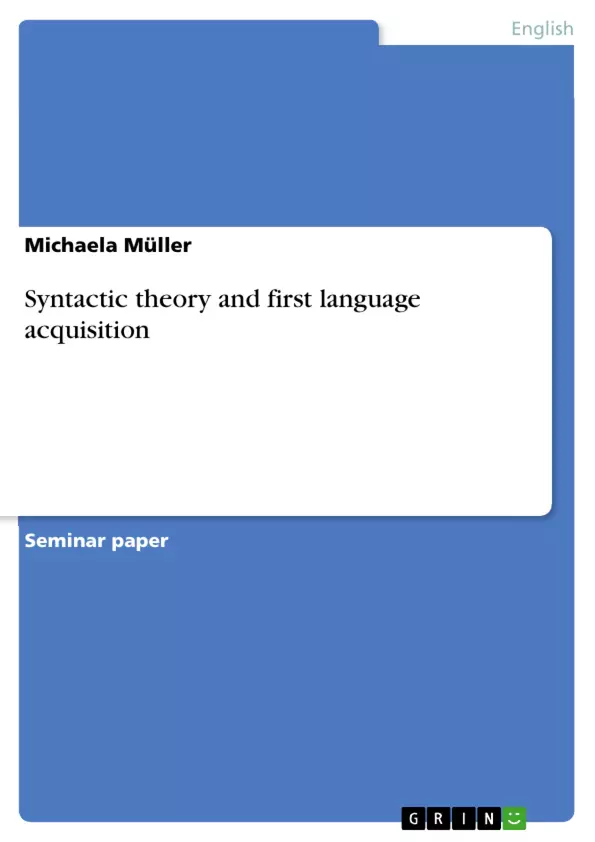Heather’s (26 months old) speech shows that she has already entered the later multi-word stage. She makes use of the three primary functional category systems (the D-system, the I-system and the C-system), which are projections of the corresponding functional categories (D, I and C).The core assumption of the X-bar model is that any word category X can function as the head of a phrase and can be projected into the corresponding phrasal category XP by addition of up to three different kinds of modifiers which are full phrasal constituents: complement, adjunct and specifier. Therefore, phrases in English have the schematic structure below:
[x’’ specifier [x’ adjunct [x’ [x head] complement/s]]]
Functional category systems, in contrast to lexical category systems, lack semantic content, but have grammatical meaning. Furthermore, functional elements permit only one complement. All of these functional category systems consist of a head, a complement and a nonthematic specifier position and so have a symmetrical structure. The following essay will describe these systems of English and the use of nonthematic specifier positions in adult grammar.
Inhaltsverzeichnis (Table of Contents)
- Essay 1:
- The primary functional category systems of English and the use of nonthematic specifier positions in the adult grammar
- Essay 2:
- The characteristics of the "categorial" stage in the acquisition of English
- Essay 3:
- Maturational theory and the acquisition of functional category systems and their associated grammatical properties
Zielsetzung und Themenschwerpunkte (Objectives and Key Themes)
This work explores the acquisition and use of functional category systems in English. The essays examine the development of these systems in child language, comparing them to the adult grammar. The primary focus is on the relationship between functional categories, their associated grammatical properties, and the role of movement in generating syntactic structures.
- Functional category systems in English
- The role of nonthematic specifier positions
- The acquisition of functional categories in child language
- Maturational theory and the development of grammatical properties
- Movement and syntactic structure
Zusammenfassung der Kapitel (Chapter Summaries)
Essay 1
This essay introduces the three primary functional category systems of English: the Determiner (D) system, the Inflection (I) system, and the Complementizer (C) system. It explains the structure and function of these systems, emphasizing the nonthematic specifier positions within them. The essay then analyzes how these positions serve as landing sites for moved constituents, focusing on examples like possessor phrases in DP and subject phrases in IP. It also examines the role of movement in case assignment and the importance of thematic roles in assigning meaning to syntactic structures.
Essay 2
This essay delves into the "categorial" stage in the acquisition of English, focusing on how children acquire functional category systems. It describes the developmental stages, the challenges faced by children in acquiring these systems, and the implications for the development of grammatical competence. The essay also discusses how children's early language production reflects the ongoing development of their understanding of functional categories and their associated properties.
Essay 3
This essay explores maturational theory, examining its implications for the acquisition of functional category systems and their associated grammatical properties. It discusses how maturational constraints on language development can influence the acquisition of specific linguistic features. The essay also analyzes the role of innate grammatical knowledge and how it interacts with environmental input to shape language acquisition.
Schlüsselwörter (Keywords)
This work focuses on functional category systems, nonthematic specifier positions, the acquisition of English grammar, maturational theory, case assignment, theta-roles, movement, and syntactic structure. It explores these concepts through detailed analyses of child language acquisition and the development of grammatical properties in English.
Frequently Asked Questions
What are the primary functional category systems in English?
The three primary systems are the Determiner system (D-system), the Inflection system (I-system), and the Complementizer system (C-system).
What is the "categorial" stage in child language acquisition?
It is a developmental stage where children begin to use functional categories and more complex syntactic structures beyond simple lexical combinations.
How does the X-bar model describe phrase structure?
The model assumes that any head X projects into a phrase XP through modifiers like specifiers, adjuncts, and complements.
What is the role of nonthematic specifier positions?
In adult grammar, these positions serve as landing sites for moved constituents, such as subjects in IP or possessors in DP.
What does Maturational Theory propose about language acquisition?
It suggests that certain grammatical properties and functional systems emerge according to a biological schedule as the child's brain matures.
- Citation du texte
- Michaela Müller (Auteur), 2002, Syntactic theory and first language acquisition, Munich, GRIN Verlag, https://www.grin.com/document/10751



